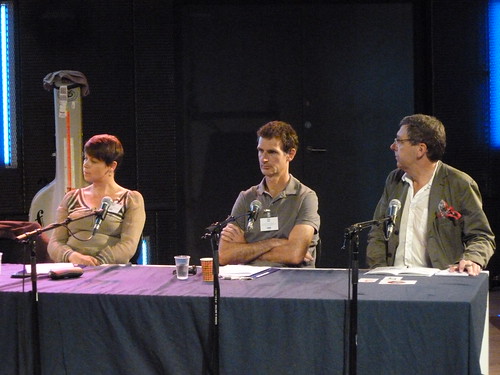Music and Nationalism
With the first Rhythm Changes conference just around the corner, I’ve been reading a range of texts which feed into the event theme of Jazz and National Identities, ranging from Roberto M. Dainottoa’s Europe (In Theory) to the latest edition of Philip V. Bohlmana??s Music, Nationalism, and the Making of the New Europe published this year. Bohlman describes the interplay between music and nationalism as a type of love-hate relationship and suggests there are three general reasons why the impact of nationalism on music leaves many people feeling uncomfortable – here’s my paraphrase of his hypothesis:
1. There is an unwillingness to accept that music can or should be used in service of the nation-state. Audiences like to believe that music is apolitical and so, by tying music to the nation state, the mystery or autonomy of art is challenged.
2. Nationalism trivialises music, as a type of levelling occurs where individual, local or regional difference is eradicated and music becomes stereotypically kitsch. Music that takes on markers of the state inevitably becomes embarrassing, ugly and repulsive.
3. Music that is used in service of the nation-state feeds into all that is dangerous and destructive. Nationalist music has a ritualistic nature that serves to erase the voice of difference; effectively, it can come to represent racism and prejudice. (Bohlman: 2011, 11-12)
During the conference, I will be keen to see how jazz feeds into these debates and how the music has been framed in relation to different national settings. This could range from discussions of jazz as America’s “Secret Sonic Weapon” during the Cold War to European jazz sounding like the embodiment of Scandinavian landscapes. The programme promises an array of perspectives and some fascinating discussions. Bohlman concludes:
“It would be almost easy to hate nationalism in music. But then we run up against those who love national and nationalist music, and they remind us that it is one thing to hate nationalism and another thing to hate music.” (Bohlman: 2011, 12)
What do you think?
The Australian Real Book
Australian scholar and musician Tim Nikolsky has compiled the Australian Jazz Real Book, and was hoping to present it at the Rhythm Changes conference. Unfortunately, he has been unable to make it, but sent us this message to explain the project.
This conference will be Dubberised

As you may well know, next week the first Rhythm Changes Conference ‘Jazz and National Identities’ takes place in Amsterdam. There will be jazz performances, keynote speakers, panel presentations, and the usual stuff that takes place at academic conferences – especially those academic conferences that happen to be about jazz.
But this conference will be Dubberised.
Don’t look it up. The verb ‘to Dubberise’ does not, to our knowledge, appear in any dictionaries. But it’s a word that has become common parlance among the members of the Rhythm Changes project.
Jazz and European Cultural Studies

Preparing a paper on “Jazz and European Cultural Studies” for the Current Issues in European Cultural Studies conference in Sweden, I came across Stuart Nicholson’s interview with Courtney Pine in the April 2011 issue of Jazzwise. As part of the interview, Pine talks about the background to his latest album Europa:
“I have always said that I am Afro, Caribbean, European, that’s who I am… To me, it means I shouldn’t feel that I can’t exploit each cultural thing and make it one, which is how I think the United Kingdom should be.”
“Europe is a lot more close than what is being proclaimed at the moment… We live on an island and it does work to say this is an isolated state, but it isn’t, there is so much cross fertilisations of ideas, concepts, identities – I dare anybody to have a DNA test and then find out they are from Holland or Sweden! This is how it is across Europe” (Pine quoted in Nicholson: 2011, 20).
Kitchen Orchestra web project completed
In the second week of May, we conducted an online practice-based research and knowledge transfer project to explore the online mediation of jazz and improvisational performance.
As part of the Mai Jazz festival in Stavanger, Norway the members of the Kitchen Orchestra collaborated with visual artists Testuya Nagato and Hiraku Suzuki to create a performance that blended composed and improvised elements.
Defining Jazz

Yesterday, at a jazz research seminar at the University of Salford, the discussion focused on Alex Lubet’s recent book Music, Disability and Society (Temple University Press, 2010).
Towards the end of chapter 2–Let”s Face the Music and Dance”–Lubet writes that the possibilities for jazz musicians with disabilities to pursue successful careers is due to “…jazz performance practice, whose essence is the embrace of difference…” (p.65).
Hamilton College Jazz Archive
Rhythm Changers may be interested in this archive (interviews in PDF and mp3 formats):


